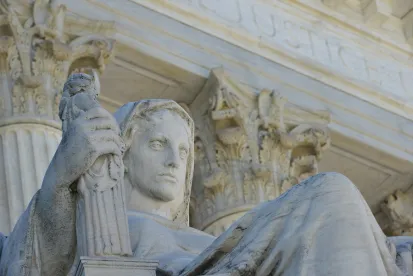The Court’s narrower interpretation of “official act” under the federal bribery statute creates a higher hurdle for federal prosecutors.
On June 27, the US Supreme Court unanimously vacated former Virginia Governor Robert F. McDonnell’s corruption conviction and erected a higher hurdle for federal bribery prosecutions. The Supreme Court rejected the government’s overbroad definition of the term “official act” in favor of a narrow construction, concluding that arranging a meeting, speaking to another official, or organizing an event—without further action—is insufficient to support a conviction under 18 U.S.C. § 201.
Background
In September 2014, a jury convicted former Governor Robert McDonnell and his wife Maureen McDonnell of bribery charges, including conspiracy to commit honest-services wire fraud and conspiracy to obtain property under color of official right. In addition, McDonnell was convicted of multiple counts of honest-services wire fraud and obtaining property under color of official right. The charges related to McDonnell and his wife’s alleged acceptance of $175,000 in loans, gifts, and other benefits from Virginia businessman Jonnie Williams during McDonnell’s governorship. At the time, Williams was the CEO of Star Scientific, a Virginia-based company that had developed a nutritional supplement made from anatabine. Star Scientific hoped that Virginia’s public universities would perform research studies on anatabine, and Williams sought Governor McDonnell’s assistance to obtain those studies.[1]
To successfully prosecute McDonnell, the prosecutors had to show that he committed—or agreed to commit—an “official act” in exchange for the loans and gifts. Section 201(a)(3) defines “official act” as “any decision or action on any question, matter, cause, suit, proceeding or controversy, which may at any time be pending, or which may by law be brought before any public official, in such official’s official capacity, or in such official’s place of trust or profit.”
The government alleged in the indictment, and maintained on appeal, that McDonnell committed at least five “official acts,” including “arranging meetings” for Williams with other Virginia officials to discuss Star Scientific’s product, “hosting” events for Star Scientific at the governor’s mansion, and “contacting other government officials” concerning anatabine studies.[2] McDonnell contended that merely setting up a meeting, hosting an event, or contacting an official did not qualify as an “official act,” arguing that his actions were limited to routine political courtesies and never exercised government power on Williams's behalf.[3]
The district court instructed the jury that to convict McDonnell, it had to find that he agreed “to accept a thing of value in exchange for official action.”[4] The district court described the five alleged “official acts” set forth in the indictment, which involved arranging meetings, hosting events, and contacting other government officials. The district court then quoted the statutory definition of “official act” and—as the prosecutors had requested—advised the jury that the term encompassed “acts that a public official customarily performs,” including acts “in furtherance of longer-term goals” or “in a series of steps to exercise influence or achieve an end.”[5] The jury convicted McDonnell of 11 counts of corruption-related offenses.
McDonnell appealed his convictions to the US Court of Appeals for the Fourth Circuit, challenging the definition of “official action” in the jury instructions on the ground that it deemed “virtually all of a public servant’s activities ‘official,’ no matter how minor or innocuous.”[6] The Fourth Circuit affirmed, holding that the district court’s jury instructions were appropriate. The main issue on appeal to the Supreme Court was the proper interpretation of the term “official act” under Section 201(a)(3).
Holding
In an opinion by Chief Justice Roberts for a unanimous Court, the Supreme Court vacated and remanded the Fourth Circuit judgment, adopting a narrower interpretation of the term “official act.” According to the Supreme Court, an “official act” is “a decision or action on a ‘question, matter, cause, suit, proceeding or controversy’” that “must involve a formal exercise of governmental power that is similar in nature to a lawsuit before a court, a determination before an agency, or a hearing before a committee.”[7] In addition, the act must be “something specific and focused that is ‘pending’ or ‘may by law be brought’ before a public official.”[8] A “decision or action may include using [one’s] official position to exert pressure on another official to perform an ‘official act,’ or to advise another official, knowing or intending that such advice will form the basis for an ‘official act’ by another official.”[9] The Supreme Court emphasized that a public official must do more than arrange a meeting, contact another official, or organize an event to commit an official act: “Setting up a meeting, talking to another official, or organizing an event (or agreeing to do so)—without more—does not fit th[e] definition of ‘official act.’”[10]
In support of its holding, the Supreme Court observed that “conscientious public officials arrange meetings for constituents, contact other officials on their behalf, and include them in events all the time” and that an overbroad interpretation of “official act” could stifle this activity.[11] Quoting an amicus brief authored by former federal government officials, the Court observed that “White House counsel who worked in every administration from that of President Reagan to President Obama warn that the Government’s ‘breathtaking expansion of public-corruption law would likely chill federal officials’ interactions with the people they serve and thus damage their ability [to] effectively [ ] perform their duties.’”[12]
The McDonnell decision aligns with the Supreme Court’s previous decision in United States v. Sun-Diamond Growers of California, 526 U.S. 398 (1999), another unanimous opinion that similarly embraced a narrow construction of the term “official act.” In Sun-Diamond, the Supreme Court held that it was not an official act under Section 201 for the US president to host championship sports teams at the White House, for the US secretary of education to visit high schools, or for the US secretary of agriculture to deliver speeches about US Department of Agriculture policy to farmers.[13] Although each of these groups could have pending matters before the public officials, the existence of such matters was not sufficient to find that any action related to them constituted official acts.[14]
In closing, the Supreme Court in McDonnell reviewed the district court’s jury instructions and concluded that the jury “was not correctly instructed on the meaning of ‘official act’” and “may have convicted Governor McDonnell for conduct that is not unlawful.”[15] Accordingly, it vacated the Fourth Circuit’s judgment and remanded the case for a determination whether “there is sufficient evidence for a jury to convict Governor McDonnell of committing or agreeing to commit an ‘official act.’”[16]
Implications
The McDonnell decision will require the government to allege and prove linkage between the official actions of public officials and their decisions or actions on specific questions or matters before them or other officials over whom they exercise influence, and the decision outlines a number of potential ways that the government may accomplish this. For example, the same conduct alleged in McDonnell could be found to constitute an official act for the purposes of the federal bribery statute if the evidence showed that setting up a meeting, hosting an event, or calling another public official (or agreeing to take such actions) was intended to exert pressure on another official to make a decision or take governmental action on a specific pending matter.
In his merits brief in the Supreme Court, McDonnell relied on the 2010 Citizens United decision in which the Supreme Court said that “ingratiation and access” were “not corruption.”[17] That year, the Court also ruled in favor of former Enron executive Jeffrey K. Skilling, holding that a federal anticorruption law governing “honest services” applied only to bribes and kickbacks.[18] Critics of McDonnell will surely argue that it will perpetuate a “pay to play” culture where major campaign donors will be able to continue to “purchase” access to government officials, whether through meetings set up on their behalf, or otherwise. But McDonnell rests solidly on the common-sense requirement that a clearer line must be established to transform common constituent activities into federal bribery offenses.
Although it remains to be seen how McDonnell will affect future charging decisions, the case appears to have established more rigorous requirements for future bribery prosecutions, including some significant ones that are now pending. The next test case will likely be the prosecution of Senator Robert Menendez (D-NJ), who was charged with eight counts of violating Section 201, among other crimes, for allegedly accepting bribes from a wealthy Florida eye doctor in exchange for legislative favors. The indictment’s recitation of “official acts” includes allegations of arranging actual and attempted meetings with public officials, such as the former secretary of the US Department of Health and Human Services to advance the doctor’s interests. Senator Menendez will likely cite the McDonnell ruling to argue that arranging such meetings does not qualify as an official act for the purposes of the federal bribery law.
Regardless of the Menendez prosecution’s outcome, the US Department of Justice will likely press Congress for reforms to clarify the statutory definition of “official act,” much like it pressed for a fix to the honest services fraud statute following the Supreme Court’s ruling in Skilling. In view of the current political calendar, it is unlikely that any meaningful action will be taken on the matter before the 114th Congress ends.
[1] McDonnell v. United States, --- S. Ct. ----, 2016 WL 3461561, *5 (U.S. June 27, 2016).
[2] Id.
[3] Id. at 5, 11. As explained by the Supreme Court, “Governor McDonnell had requested the court to further instruct the jury that the ‘fact that an activity is a routine activity, or a settled practice, of an office-holder does not alone make it an official act,’ and that ‘merely arranging a meeting, attending an event, hosting a reception, or making a speech are not, standing alone, official acts, even if they are settled practices of the official,’ because they ‘are not decisions on matters pending before the government.’ He also asked the court to explain to the jury that an ‘official act’ must intend to or ‘in fact influence a specific official decision the government actually makes—such as awarding a contract, hiring a government employee, issuing a license, passing a law, or implementing a regulation.’ The District Court declined to give Governor McDonnell’s proposed instruction to the jury.” Id. at 11 (internal citations omitted).
[4] Id. at 10.
[5] Id.
[6] Id. at 11 (citing McDonnell v. United States, 792 F.3d 478, 506 (4th Cir. 2015)).
[7] Id. at 17.
[8] Id.
[9] Id.
[10] Id.
[11] Id. at 18.
[12] Id. (citing Brief of Former Federal Officials as Amici Curiae in Support of Petitioner).
[13] United States v. Sun-Diamond Growers of Cal., 526 U.S. 398, 407 (1999).
[14] See McDonnell, 2016 WL 3461561 at *15 (citing Sun-Diamond, 526 U.S. at 408).
[15] Id. at 21.
[16] Id.
[17] McDonnell v. United States, Case No. 15-474, Brief for the Petitioner at 25 (U.S. Feb. 29, 2015); Citizens United v. FEC, 558 U.S. 310, 360 (2010).
[18] Skilling v. United States, 561 U.S. 358 (2010).



 />i
/>i
